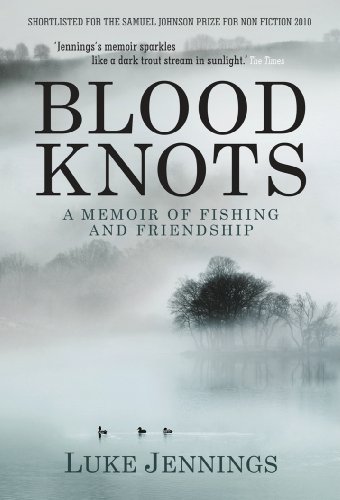Luke Jennings’s angling memoir, Blood Knots, is amongst the most fascinating and engaging books I have read. Indeed, I could well be tempted to put it right at the top of the list. That is quite a statement, and I have thought very carefully before making it. But I cannot recall any book, let alone one that can reasonably be described as an angling memoir, in which I have become so engrossed. Nor can I think of many so beautifully written.

It is difficult to justify such eulogising to those who have not read a book, for no description can ever really convey its qualities to others. But I shall try.
At the outset, I wondered whether I was about to be drawn into a dark, sinister, almost Gothic world. The opening chapter takes us, at dead of night, to the Regent’s Canal, by the gas works behind King’s Cross station, dead-baiting for pike. I might have given up there. What drove me on, though, were three things – the quality of Jennings’ writing, which is superb, the philosophical layering it achieves and which makes it so profound, and the minutely observed detail that took me to the waterside with him. Only when we reached the final chapter did the circular nature of the book become clear.
The intervening 18 chapters trace the author’s piscatorial progress from the sparking of interest on a boating lake, through early reading of didactic angling classics and countless fishless or near fishless boyhood days in Sussex and Powys, to a steep and sometimes stumbling climb up the hills of learning on holidays in Shropshire and at home in Sussex, to his challenging introduction to trout fishing while at Ampleforth College in North Yorkshire. So vividly does Jennings paint the glint of sunshine on the water, the tremor of the float, the glimpse of a dark shape drifting in the depths, the flash of a fish in the ripple and the slash of a trout to a fly, that all these become ours as much as his.
As the memoir progresses, Jennings takes us on major diversions to meet two men, both of whom he admired greatly – his father, an armoured corps officer dreadfully burnt in a tank battle during the Second World War, and Robert Nairac, the young army intelligence officer kidnapped in South Armagh and murdered by the Provisional IRA. Nairac came into Jennings’s life as a ‘young master’ at preparatory school, a school leaver filling a year before going on to university. They hit it off at once; Jennings empathised easily with Nairac’s independence of spirit and passion for field sports, and they became and remained friends until Nairac’s death, which Jennings describes laudably dispassionately.
To delve further into Blood Knots in a review might be to spoil it for others. But, as some justification for my assessment of it as one of the finest books I have read, I was interested to discover subsequently that another of Jennings’s books, Atlantic, had been long-listed for the Man Booker Prize, and that Blood Knots had been selected in May this year as BBC Radio 4’s ‘book of the week’.
Read it; you will not regret it.



